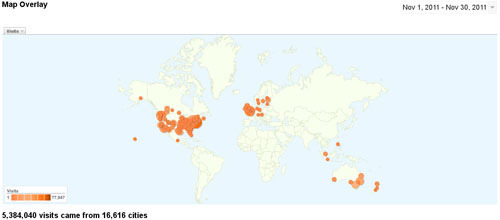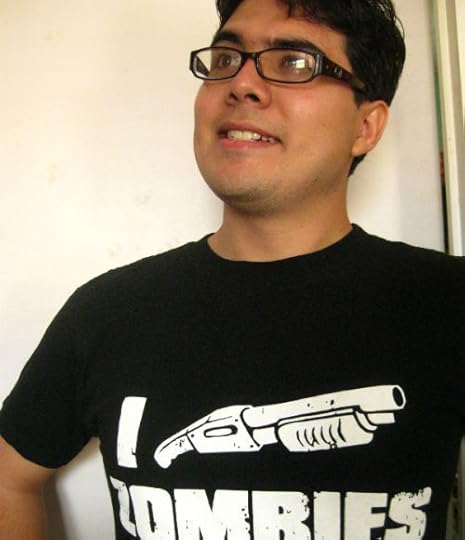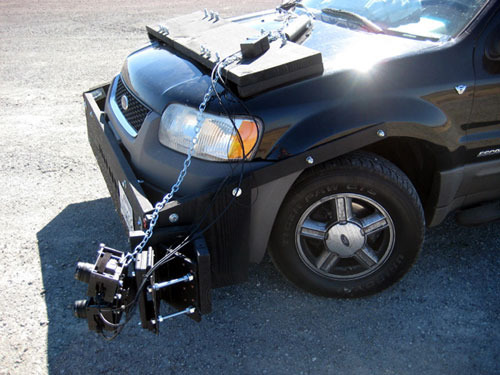Chris Baty's Blog, page 246
December 9, 2011
I wrote a novel. Now what?

My friends, I have got a wicked case of the Decembers.
It happens every year. NaNoWriMo ends, and once the TGIs are all O, I'm left trying to remember how I filled my time when I wasn't writing a novel. (Or, let's be realistic, updating my word count on the site, tweeting about my novel, talking to other people about writing a novel, and doing very important things in order to avoid working on my novel. I'm pretty sure I spent more time doing all of those things than I did actually writing in November.)
I always say it's like riding a really scary roller coaster. When you're on it, you're not sure why you thought it was good idea and you're a little worried you might barf. Then you get off, and your immediate response is, "Oh my god, I'm so happy to be off that crazy thing." (The "Thank God It's Over" party is aptly named.) But then you go back to riding the carousel or whatever, and it suddenly seems kind of boring in comparison to the thrills-a-minute near-death experience of the roller coaster.
And yet, given how little motivation I have for anything right now, it's just as well I'm not trying to accomplish anything useful this month. Apparently, my response to a sudden onslaught of free time is to do absolutely nothing. Or at least, it feels like nothing in comparison to how much I was accomplishing last month. I'm dragging myself out of bed every morning like I'm facing a firing squad instead of my computer. And I'm working in my pajamas a lot more than I should admit to on the internet just because getting dressed seems like so much effort. (This is both the blessing and the curse of working at home.)
It's not surprising. After all, we spend November in a break-neck sprint fueled by adrenaline, caffeine, sugar, and a weird combination of peer pressure and comforting companionship from our fellow novelists. (This doesn't make NaNoWriMo sound very healthy, does it?) It's hardly shocking that the crash from that absurd high is a big one. It doesn't help that I got my traditional post-November plague on November 12, and I'm still fighting off the last of it now.
I'm powering through, sort of. It feels like an accomplishment to be writing a blog post about how unmotivated I am. (Is that irony? It might be irony.) I have so many things I should be doing, and I'm staring at my to-do list wondering how much of it I could convince my cat to do.
Have you been hit with a nasty attack of the Decembers? How are you coping? And, more importantly, any ideas how I can train my cat to answer email?
– Sarah
Photo by Flickr user jsoffer
December 8, 2011
NaNoWriMo: A Writer's Vacation from Nonfiction

Eleven months out of the year, I write nonfiction. I tend to write shorter-form essays that don't necessarily have a ton of dialogue or require the carefully crafted plot arc that a traditional novel requires.
So November presents itself as a delightful opportunity to take a break from my usual writing projects and subject matter, and exercise other writing muscles: dialogue, character development, long-form narrative arc, and the simple act of fabrication.
Now that the month has ended, I am slipping back into my nonfiction writing practice, trying to meet a deadline I conveniently ignored in favor of my luxurious November of fiction-writing. And right now, working on my nonfiction project feels a lot like stepping out of a bubbling hot tub and cannonballing right into the deep end of the swimming pool.
I know a lot of your are starting the revision process on this or a previous NaNo-novel. For those of you starting—or returning to—a new or different project in another genre, how do you make the transition? Are you gasping from the shock of it? Please share your project-hopping tips with me!
– Lindsey
Photo by Flickr user Matt Lehman
December 7, 2011
The Magic Assignment

The Young Writers Program exploded with activity this past November, with the highest win rate for participants in the history of our program. The success of YWP has everything to do with your participation and donations, and with the fantastic educators we get to work with. Laura Bradley, a middle school teacher in Petaluma, CA, graciously shared her experience with us.
The bell rings, my classroom door flies open, and Tony comes hurtling through. "Can we write today, Mrs. Bradley? Please, please tell me we're gonna write today!" He glances at the white board, sees "writing" on the agenda, and throws his hands up in celebration. "Yes!"
In 20 years of teaching, I have never seen students this eager to write. Sure, I have had success in the past with writing assignments that were tailored to engage my often-reluctant eighth grade writers, and I have seen them respond with enthusiasm to many writing pieces. But I am sure that I have never had students beg for writing time day after day. Nor have I seen them write silently and focused for a solid 45 minutes, day after day. So what is this magic assignment?
National Novel Writing Month offers a bold challenge to writers: pen a 50,000-word novel in the month of November. I first heard about NaNoWriMo a couple years ago, and my college-age daughter participated last year. Although I was intrigued by it, I never considered offering it to my students. 50,000 words is no small writing task, and the last thing I want to do is set my kids up for failure. Then I discovered the Young Writers Program aspect of NaNoWriMo, and the magic began.
I couldn't sleep the night before I told my students that they would be writing a novel in a month. I told a colleague about the project, and he predicted they would run screaming from the classroom or sob with fear. Write a novel in eighth grade? Write a novel in a month? One seems impossible. Both? Crazy. So I tried to hook them by appealing to their desire to be the first: "You are about to do something that no student at our school has ever done! No teacher at our school has ever done it either! You are going to write a novel in a month!" Then I promised that they would have time in October to plan their novels, and that I would help them through the process in November. The icing on the cake was that I would suspend all other class work and homework for the month of November; I would only ask them to write their novels.
Also, the Young Writers Program allows students to choose their own word count goal. After lessons on how many words they can write in one sitting and what would be a reasonable 30-day goal for them, we were ready to dive in and take the challenge. "Trust me," I said. They were excited but wary.
When November 1 finally arrived, my students came to class armed with character descriptions, conflict plans, and plot outlines. And they wrote. And wrote. And wrote some more. And they didn't talk. And didn't complain. And had to be told to stop writing when it was time to pack up for lunch. Day 1 of NaNoWriMo was a hit. And so was Day 2, Day 3, and every day that we worked on our novels. They were invested in their writing, took ownership of their novels, and were fully engaged in this crazy "month of literary abandon." They wrote more than they have ever written in their lives. And they loved it.
I wrote a novel along with my students, and sharing the process with them was great fun (and so hard! What a challenge!). Our principal even signed on, and often brought her laptop into our classroom to write with us. For a month, we were all novelists, hard at work.
Photo by Laura Bradley
December 6, 2011
NaNoWriMo's Gasp-Inducing 2011 Stats!

The end-of-event stats blog post has become one of my favorite NaNoWriMo traditions (and I derive great pleasure from looking at these stats posts from years past, too…). I hope you enjoy devouring this year's numbers as much as I enjoyed compiling them!
General Stats Round Up!
For NaNoWriMo main:
256,618 participants, up roughly 28% from 2010's total of 200,530 writers.
We wrote a total of 3,074,068,446 words, up 7% from 2010's collective word count of 2,872,682,109.
This averaged out to 11,979 words per person!
We had 36,774 winners, giving us a 14% win rate!
For NaNoWriMo's Young Writers Program:
81,040 participants, up 19% from 2010's total of 68,710.
We wrote a total of 368,143,078 words up 40% from 2010's collective word count of 262,303,074.
This averaged out to 7,199 words per person.
We had 16,334 winners, giving us a never-before-precedented 32% win rate!
Our site traffic was way off the charts this year, as well.
In November, we had 5,384,040 visits, up 12% from 2010's 4,796,947. We had 42,915,395 pageviews, up 58% from 2010's 27,215,323.
Top 50 NaNoWriMo Cities (according to Google Analytics, based on number of November visits from these fine places)
New York 77,947
London 62,286
Seattle 55,205
Toronto 46,413
Sydney 46,390
Los Angeles 45,806
Chicago 42,720
Melbourne 40,588
Portland 38,898
Denver 37,972
San Francisco 36,808
Minneapolis 28,521
Austin 28,095
Houston 25,863
Washington 25,812
Brisbane 23,033
Calgary 22,294
Edmonton 21,618
Ottawa 21,583
San Diego 19,815
Helsinki 19,793
(not set) 19,435
Phoenix 18,556
Salt Lake City 18,347
Vancouver 18,082
Boston 17,850
Philedelphia 17,664
Columbus 17,558
Tucson 17,551
Kensington 17,262
Ballinger 16,159
Dublin 16,022
Dallas 15,761
Albuquerque 15,069
Perth 14,949
St Louis 14,910
Auckland 14,873
Edinburgh 14,575
Montreal 14,260
Singapore 13,993
Colorado Springs 13,933
Indianapolis 13,680
Manchester 13,549
Adelaide 13,477
Sacramento 13,256
San Antonio 13,170
Atlanta 13,065
Grand Rapids 12,939
San Jose 12,925
Madison 12,650
Top 50 NaNoWriMo Countries (according to Google Analytics, based on number of November visits from these fine places)
United States 3,605,003
United Kingdom 508,260
Canada 385,383
Australia 160,936
Germany 99,752
Netherlands 66,174
Finland 51,164
France 44,186
Sweden 41,244
New Zealand 32,109
Norway 21,368
Ireland 21,365
Philippines 20,333
Spain 18,887
Denmark 15,888
Japan 15,859
Singapore 14,007
South Africa 13,861
Austria 13,436
India 12,828
Belgium 12,494
Mexico 11,762
(not set) 11,483
Brazil 11,170
Italy 10,820
Portugal 10,261
Poland 9,711
South Korea 9,685
Switzerland 8,956
Indonesia 6,918
Malaysia 6,618
Israel 6,014
Hungary 5,945
Latvia 5,303
China 4,665
Romania 4,454
Greece 4,262
Russia 3,943
Hong Kong 3,799
Croatia 3,135
Argentina 3,067
United Arab Emirates 3,021
Puerto Rico 2,949
Thailand 2,719
Estonia 2,655
Taiwan 2,457
Turkey 2,089
Ukraine 1,974
Czech Republic 1,914
Malta 1,850
How fun was that?!? We'll be adding top wordiest regions by total word count and by average words written per Wrimo, too.
If this was your first NaNoWriMo, how did it go? If you're a returning Wrimo, how did this NaNoWriMo feel different from previous years? Did the faster site make it easier to get where you needed to go? Did you meet any interesting characters at write-ins? We'd love to hear your thoughts, impressions, and highlights of NaNo 2011!
And please include your site username in your comment; we're giving away a spot in Lani Diane Rich's StoryWonk Revision Class! (We thought that was the perfect way to kick off the season of novel revision that lies ahead.) We'll announce the randomly selected giveaway winner on December 20.
– Lindsey
December 5, 2011
Short Story, Long Story

Every November, our incredible MLs from all around the world, in addition to their own novels, sit down and compose some incredible pep talks for the Wrimos in their regions. One of our favorite things to do is to read these works of creative inspiration. Emily Bristow made sure we all read this one from our ML in Southern Mexico, Andrés Cruz y Corro, and we wanted to share it with you as we start to reflect on 2011's literary adventure:
Thirty days ago, a man (or maybe a woman; I'm not quite sure) heard that it was possible to write a book in just one month and this person, unlike their acquaintances, didn't think it was a preposterous idea. For an instant, this person imagined themselves holding a book in their hands, with their name on the cover; standing in a special place among some of their favorite authors of all time.
I wouldn't tell you this story just to tell it. Stories aren't about common people doing everyday things. Stories are about extraordinary people, beating the odds, doing things nobody else could do. Stories are about heroes of all sizes and shapes, wherever they may be found.
This man (or woman) is one of those heroes. They thought for a minute that they had a chance to be an author, to have a book under their belt, to be remembered as the mind behind a novel. He, or she, is a hero, just like Theseus, King Arthur or Harry Potter.
That person, of course, is you.
You sat down one fine day and put a word on paper (or screen). Then another one, then another one. Some of you did this fifty times. Some of you did it a hundred, a thousand times. Fifty-thousand times. A hundred-thousand. I don't know how many, but you did it. You stopped being a consumer, a guest at the feast. You became a creator, the Chef, the one whose mission is to give others inspiration, to nourish someone else's imagination.
When you started it looked quite easy, but as the days went by, you saw how difficult it was. That didn't stop you. You wrote for thirty days, aiming to create a great book. You might've changed your routine, maybe stopped seeing friends and family; maybe you skipped a meal or two. Maybe you didn't get to the goal of 50,000 words, but you certainly tried.
That, my friends, is what separates heroes from non-heroes. Heroes are the ones who try (and often fall short of their goals). Heroes do, non-heroes don't. Remember the heroes you've read about: they never, ever sit around waiting for something to happen, for someone else to change things. They are the ones who face the music. Everyone remembers only those who actually did something; those who did nothing aren't even named in the books.
Many are the heroes in our great works of fiction but you, my friend, are real—quite real. You have already done something; you've already faced the odds stacked against you. Aren't you a hero? I think you are.
If so, that means your life is a story, just like those in the books and movies. Have a seat and think about it for a moment: your life is being told right now. What's it about? It's up to you. A big thriller, or a romance? Maybe science fiction/adventure/mystery? It's a big question and I don't claim to have the answer to it.
But I do know this: you have already proven you can do great things. Even if you only wrote a few hundred words. You heard about an impossible thing to do and you set out to do it. How awesome is that?
If you can write a novel in just thirty days, what else can you do? You've done one great thing, but your story isn't over: it will go on until the day you die. What will your next move be? Remember, we write about the things our heroic characters do, not about the things they only thought about doing. You are the main character here, the hero. If you don't believe me, look at what you just did.
Go on, have some sleep, a nice meal and do something else. Many of the people around you might never realize they're also heroes and their story will never be told. But you know what you are: now go and live up to the name. Do something worth telling your children. Heroes may die, but stories don't.
I'm your #1 fan.
Andy is almost 24 now and lives in Mexico City, finishing his thesis research to become an Environmental Engineer. He loves singing (in baritone voice, please!), cooking, and aims to be a master at Slide-Speaker-Fu.
Photo by Isabel Cruz y Corro
Of Alcatraz and Theft

I fulfilled a longtime (and touristy) dream of mine last weekend: I went to Alcatraz. The prison, which housed such notable criminals as Al Capone and Robert Stroud "the Birdman," is a formidable structure, standing alone in the wind on its rocky little island in the San Francisco Bay. The trip was informative and interesting, but my personal fascination goes beyond its historical significance, and into the literary. Alcatraz is often compared to Azkaban prison in the Harry Potter books, and I spent most of the audio tour imagining Sirius Black sitting in one of the cells. (I may or may not be planning to photoshop Dementors into the pictures I took.)
Fangirl-ing aside, the trip got me thinking in a more serious vein about writers and our penchant for theft. Not actual theft, of course (though I suppose, statistically, there are likely some shoplifting or bank-robbing writers out there). Rather, the practice of borrowing things from the world around us and writing them into our work, be it thinly concealed or not. There is a fine legal line to be cautious of, obviously: libel and plagiarism are serious offenses. But "creative repurposing," as I like to call it (or, to be gentler still, "taking inspiration from the world around us") is a writer's realm. Some would even say it is our forte.
I commit this kind of theft most often without noticing I am doing so, and it is only in later rereading that I recognize the snippets I've torn from real life. Sometimes it's something very small and specific, like the bald spot of the man next to me on the train. Sometimes it's bigger, like an entire location, or a character based on someone I know. Our surroundings have a profound impact on us, and I believe they usually seep into our writing somehow, whether in terms of setting, character, or even simply tone.
Tell me, Wrimos… Do any of you have literary based-on-real-life places you'd like to visit? And what about your own thieving—what have you stolen from the world at large?
– Paige
Photo by Flickr user Robert Brun
December 2, 2011
"I'm Making My Script Frenzy Script!" A Q&A with Stephen Norrington

As Script Frenzy grows, more and more established filmmakers are getting in on the fun. Writer/director Stephen Norrington, best known for directing Blade and The League of Extraordinary Gentlemen , began shooting his Script Frenzy screenplay in Los Angeles this year. We checked in with Stephen via the interwebs to see how the project was going.
Your current film project has its origins in Script Frenzy. What's the story there? In 2008 I was developing Clash of the Titans but it wasn't going well. Warner Brothers were lukewarm on my "vision" and I wanted to rewrite their expensive script. In the six months or so it took them to fire me, I cast around for something else I could do to stay productive. Script Frenzy 2008 was happening at that time so I leapt in, blazing with all the art power that Warner Brothers had squelched. The result was "Untitled Norrington Genre Project #1", a car chase action fest that turned out great, best script I've written in years.
The life-changing thing about the experience was the absolute exhilaration that came from writing whatever came to mind, no need to ask permission from the suits. After Script Frenzy finished I was still on fire so I wrote two more scripts and embarked on two more writer-director development deals. The scripts turned out great but the deals evaporated. In late 2010, I took stock and realized that a) HD camera technology had finally become truly affordable and b) I had the scripts, the know-how, some cash and the time to attempt to make my own movies in-house, no studio required. So here we are.
You've directed films like Blade and The League of Extraordinary Gentlemen with huge teams. You're taking a very DIY approach for this film, serving as writer, director, cameraman, editor, props manager, and special effects team. Do you miss working with other human beings?
I miss the socializing aspect of a collaborative project but I don't miss the compromise and endless chat that teamwork seems to require. It's a temperament thing. In the past whenever I finished a "real" movie I moaned to anyone who would listen that making it was "the worst experience of my life." Now I realize I was suffering like a square peg hammered mercilessly into a round hole. I've got a good eye and technical chops but that's not enough. One has to play well with others—and that ain't me. So I work alone and get my social time eating nachos at my local bar.
What are the biggest challenges of making a film mostly on your own?
Time, definitely, because everything has to happen in sequence. I have to research the car design before I can design the car so I can make the miniature so I can shoot the greenscreen elements. And don't forget the little sculpture of the guy driving the car. What's he wearing? Hmm. I guess I ought to design that too. Everything is intertwined and one pair of hands can only go step-by-step. That makes staying motivated hard at times, working for weeks while the Great Progress Bar in the Sky barely creeps at all. But the good news is that the typical development-to-release period of an average studio movie is about five years. Until I hit that mark I'm ahead of the game.
How many hours a day do you work on it?
About 11, seven days a week but I don't pressure myself to achieve. That's the raison d'etre of this whole mad endeavor: no buffoonish corporate schedules to wring the joy out of the work. Why be my own studio executive when I can work on my project as much or as little as I like? Whenever I get sick of drilling holes or painting greenscreen I head out and indulge in those aforementioned nachos.
For the gear nerds out there, what equipment are you using to make this movie?
For shooting, Panasonic Lumix GH2 cameras, very affordable and lightweight with exceptional HD video and interchangeable lenses. For editing, post-production and visual effects, Adobe After Effects CS5, an amazing piece of software that can do practically anything with pixels. It has terrific sound editing capabilities too. I also depend on Photoshop CS5 for my stills work and elements preparation and I custom-built some camera rigs for driving and miniature shots (those years of machine shop really paid off).
When the film is finished, can we get Script Frenzy in the title? ("Script Frenzy Presents a Majestic New Work By Stephen Norrington…")
Yes, of course, except it'll appear in the end credits and read "Written as part of Script Frenzy 2008." Other than that it'll be just like you said.
Is there anywhere folks can go to see some of your work in progress?
Not at this time. My visual ideas and story elements are the project's commercial value so, for licensing purposes, I need to keep my powder dry. But I'm keeping a detailed record of my progress. When the flick's finished there'll be a wealth of behind-the-scenes material to excite anyone who cares.
Photo of Stephen's homemade camera rig courtesy of the filmmaker.
Six Crucial Questions for Keith Blount of Scrivener

Each year, we interrogate one or two NaNoWriMo corporate sponsors on the OLL blog. It's our way of saying thanks for the vital funding that our sponsors contribute to NaNoWriMo and the Young Writers Program. Today, I asked the generous, mysterious Keith Blount of Scrivener some hard-hitting questions about halogen light bulbs, children as coders, and the pernicious rumor that his software contains a virtual homunculus who will write your novel for you if you awaken it properly.
(And yes, that's Keith in the Obi-Wan bathrobe, above.)
So Scrivener's parent company is called Literature & Latte—clearly a touching homage to Letters and Light. Do you prefer incandescent or compact fluorescent bulbs?
Well, as much as we do love Letters and Light, "Literature & Latte" was what I always intended to call my bookshop café—but unfortunately I was too lazy to run one, so I applied it to a software company instead. That theoretical café would almost certainly have been lit by energy-saving tornado bulbs with bayonet caps. Mind you, I also have as much of a soft spot for halogen spot light bulbs as the next man.
Literature & Latte's About Us page reveals a somewhat shocking fact: Your coding, management, and marketing team consists entirely of children. How do you manage the quality-control issues that arise from having such young employees?
If we find a single bug, we call them "wild things," then send them to bed early with no supper. (We've also told them that the term "bugs" is used because if they make any mistakes, bugs crawl out of the screen and into their ears and eyes.) That seems to do the trick, along with the fact that we have Matt Smith tied up in the L&L lock-up. The children know that he won't be released to make another series of Doctor Who unless they get things right (the first time, thank you very much).
You describe Scrivener as an "unbloated" piece of writing software. What are some of the craziest feature requests you've received over the years?
The craziest ones are usually the ones that start, "I love your software but it would be great if…" and then proceed to describe turning it into a completely different application that tracks the amount of flour used in all the pancakes they've made over the years or something. We don't get many like that, though—fortunately most of the suggestions and feedback we receive are really useful and not crazy at all. The phrase I have come to be most wary of in requests is: "I am sure you will make millions and lots of users will want to buy your software if…" This is usually followed by something particularly abstruse that only about four users in the world would ever use, all of them palaeontologists keeping detailed spreadsheets about philately.
Does the spell-check on Scrivener default to British English as part of your agenda to get Americans to use a "u" in the word "favorite"?
If only! We do get lots of Americans telling us we've spelled "licence" wrong on the website, though, and asking for a free licence in return for spotting the "typo." (Webster has a lot to answer for, taking our crazy spellings with their Middle English legacies and turning them into something that actually makes sense.)
Is it true that the Windows version of Scrivener has a "Easter egg" hidden somewhere in the binder that will write your whole novel for you if you unlock it?
Who told you that? It's supposed to be top-secret. Even if you find it, though, the catch is that it's in Ukrainian and if you don't hit "Compile" within a three-second window, every third letter gets replaced with an asterisk. Also, it doesn't write your novel, but the novel of the person who bought Scrivener before you. (This last part is a bug and we've cancelled Christmas until our child employees fix this, although at this rate we may have to take Arthur Darvill hostage, too.)
On the Literature & Latte site, you admit that you still haven't written "The Novel." Is there anything we can do to help you get it done?
You're already doing it! I finally sat down to do NaNoWriMo myself this month, after many years of either threatening or giving up part-way through. I haven't exactly followed the rules properly as I have used the month to work on something I'd already sort-of started, but it's been incredibly productive and, although "The Novel" certainly isn't anywhere near finished, throwing myself into it in the spirit of NaNo for the past four weeks has enabled me to see the way forward with it, get a good start and to see where it's going. So thank you!
Thank you, Keith!
December 1, 2011
I didn't win. And I'm okay with that.

So this year, I clearly didn't win NaNoWriMo. It's the first time since 2006 that I haven't won, and it's my first year not winning as a staff member.
This just wasn't the year for me. I couldn't get into my story idea (in spite of the incredible ideas offered to me by the NaNoWriMo community in response to my staff video). I didn't have a lot of free time. Throw in my epically awesome trip to San Francisco right during crunch time when I should have been writing, and I just plain ran out of time.
And you know something? I'm okay with that.
It's not the first year I haven't won. It's always real life kicking me in the teeth. One notable year, it was because I had a baby. For some reason, the doctors frown on noveling while delivering a baby. I have no idea why… I think all the AAAAGGGHHH and shrieking would have been great for my word count. I totally could have turned on Dragon Naturally Speaking!
Wouldn't have been very readable, though. Probably thin on plot.
So this year, I only got a little over 9,000 words. But you know what I did?
I got to explore characters I've never met before. I got to collect some really awesome ideas for future use. I got to meet hundreds of people from all over the world at the Night of Writing Dangerously. I got challenged to a word war by Chris Baty. And beat the pants off of him.
I have 9,000 words I didn't have before.
To quote one of our esteemed MLs, Saker Pup:
Every time you try something new, you risk failure. That's why most people who aren't small children don't try new things.They spend their lives creating a routine that will insulate them from doing anything unfamiliar because most people can't do unfamiliar things perfectly. And if you don't know exactly what you're doing all the time, you might accidentally screw something up and fail.
I'll tell you a secret: I fail at most things, at least at first, and it hasn't killed me yet.
Failure isn't something to be afraid of. Failure means I tried.
Failure is the process I must endure before I can achieve success.
Failure is beautiful.
I might not have won NaNoWriMo 2011, but I don't feel like a failure. If anything, I did something that millions of people worldwide will never do. I tried. I wasn't afraid of starting. I did do something amazing!
And I'm not done yet. I have a new story, with a new plot… and I'm going to keep on writing, no matter what. And in December, I'll have more time!
– Heather Dudley
Photo by Flickr user HorsePunchKid
November 30, 2011
The Email That Launched NaNoWriMo

Fast Company magazine has been running an intriguing series called Starred, where they showcase innocuous emails that went on to do surprisingly big things. It inspired me to dig through my old Yahoo! account and see if I could find the email I sent out to my friends in 1999 inviting them to take part in a ridiculous book-writing endeavor I'd hatched the night before. Here's that email, in all of its exuberantly imperfect glory.
From: Chris Baty
To: friendlist
Sent: Sunday, May 30, 1999 8:51 PM
Subject: national novel month
Hear ye! Hear ye! Come one, come all, and dust off those word-processing devices!
Under the motto "A lousy novel is better than no novel at all," I have declared July National Novel-Writing Month.
To celebrate, I want to write a novel. In a month. And I want you to write one too.
Everybody's got a ton of stories in them. Collectively we have lived over 700 years, and in that time we've accumulated enough characters, places, and plot twists to fill a dozen tomes.
I am proposing that we seize art by the horns, and spill some of those experiences onto the page.
This will be a great exercise for everyone interested in storytelling who has thought fleetingly about writing a novel but has been scared away by the time and effort involved. As you write, you can draw comfort from the fact that, all around the country, other National Novel-Writing Month participants are going through the same joys and sorrows of producing the Frenetic American Novel.
Because the writing time is so short, the only thing we're looking for is length. Reach 200 pages (just 7 pages a day!) and you're done! Quality is of no concern. Don't have an ending? Just stop writing at page 200—real writers do it all the time! No plot? No worries! Some of the best novels of the past 20 years haven't had plots.
I think all of us will surprise ourselves with what we are able to produce in such a limited window of time. The short working period will prevent the second-guessing and foot-dragging that can stifle creativity. It will also limit the "I should really be working on my novel" guilt to a one-month window.
Ok, the breakdown:
What: Writing one 200+ page novel from scratch in a month's time.
Who: You! I can't do this unless I have some other people trying it as well. Let's write laughably awful yet lengthy prose together!
Why: The reasons are endless! To actively participate in one of our era's most enchanting art forms! To write without having to obsess over quality. To be able to make obscure references to passages from your novel at parties. To be able to mock real novelists who dawdle on and on, taking far longer than 30 days to produce their work.
When: Writing begins July 1. Completed, printed manuscript due to Chris by midnight on July 31.
Interested? I'd like to have a meeting either June 16 or June 17 to discuss particulars. Call me at home or email me!
– Chris B.
Photo by Flickr user sporkist
Chris Baty's Blog
- Chris Baty's profile
- 63 followers



